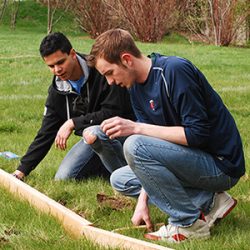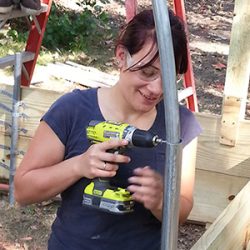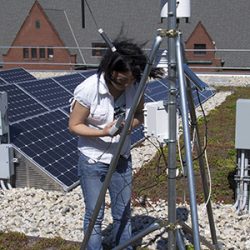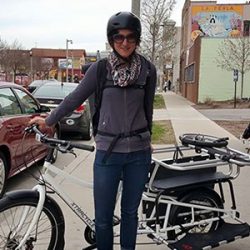
Our mission behind our composting programs is to implement a more sustainable way of handling UWM’s waste. We keep kitchen scraps from entering the traditional waste stream landfill, turn that waste into valuable fertilizer, and help reduce UWM’s greenhouse gas emissions. UWM composts, on average, 200,000lbs per year. We manage two separate streams for compost.
On Site Composting (Hoop House)
Our onsite composting program utilizes a number of static piles and an Earth Cube to break down fresh fruit and vegetable scraps, egg shells, and coffee grounds into a finished product. The Sandburg Café collects pre-consumer food scraps in their kitchen, which are added throughout the week to the compost piles by student employees and volunteers. Further, we offer a voluntary opt-in composting program – Panther Pails – which allows the campus community to also contribute to onsite composting. After a few months of careful monitoring, turning, and important microbe-assistance, the food scraps in these piles become a nutrient-loaded fertilizer that the Office of Sustainability uses on garden plots found all around campus.
You, too, can collect your own food scraps at home or in your office and bring them to the UWM composting operation. Register here
and grab a clean Panther Pails bucket at the UWM Hoop House. Contact Abigail for more information! alwilley@uwm.edu.
WHAT TO PUT IN YOUR PAIL
-
- Coffee grounds (no filter)
- Egg shells
- Fresh fruit scraps (e.g. apple cores, orange peels, strawberry tops)
- Fresh vegetable scraps (e.g. carrots peels, broccoli stems)
Off-Site Composting
Other forms of food waste like meat, dairy, or after-meal scraps are hauled by our off-campus partner, Compost Crusader. Post-consumer compost is collected from the Sandburg Cafe dining hall and from UWM’s 20/20 Catering. Compost Crusader takes the food scraps has an industrial composter, Blue Ribbon Organics.
Student Spotlight





